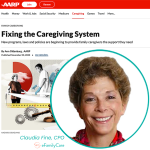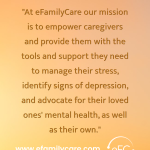“My father has congestive heart failure.” explained Tim. “He has had two recent emergency room visits and I don’t know what this means or how to deal with it!”
Tim had not been aware of his father’s condition until he received a call from the emergency room.
Felicia, a Care Adviser with many years working in health care, responded immediately to Tim about his father’s situation. “Tim, you sound very upset which is certainly understandable given the situation. It would help if you could provide me with a little more information. Were you aware of your father’s condition? I see from the information you provided in the app that you live quite a distance from him. How often do you see him? It would be helpful if you created the questionnaire in the tiles to the right of your screen. This will give me get a better understanding of your concerns and your father’s situation.” Tim was most concerned about not understanding his father’s condition. He had not been aware of his father’s condition until he received a call from the emergency room. He rarely saw his father – not just because of geographic distance, but because of their longstanding difficult relationship.

Tim was anxious about approaching his father so Felicia suggested they work together to create talking points and anticipate Richard’s resistance.
eFamilyCare Tweet
Create a plan.
To explore these complicated issues, Felicia suggested that she and Tim schedule a video chat. During the chat Tim shared, that despite the conflicts he has had with his father, he felt obligated to take care of him now.
Felicia suggested that she and Tim create a plan to help him assume caregiving responsibilities for Richard. Tim was anxious about approaching his father so Felicia suggested that they work together to formulate some talking points and try and anticipate Richard’s possible resistance. As a result, Richard successfully convinced his father to let him come for a visit.
Felicia suggested that they schedule another video chat while Richard was there, so she could “meet” his father and help Richard do a home safety assessment.
Felicia sent several articles from the eFamilyCare knowledge center which explained the causes and care of CHF. Felicia called attention to the importance of having a low sodium diet and to watch for swelling in the legs as a sign that his heart was not effectively working.
Manage priorities to avoid being overwhelmed.
Prior to the video chat, Tim messaged Felicia that he was with his father and was shocked by the situation. The small home was disorganized and unclean. His father was using a walker and was sleeping on the sofa because he couldn’t climb the stairs to his bedroom. His diet was mostly canned soups, frozen food and take-in Chinese food. He had stopped driving years ago so he rarely went out. There were many medication bottles and it was as unclear what medicine’s his father was currently.
On the video chat, Felicia suggested that Tim introduce her to Richard as a friend who can help. Together, they did a complete home safety assessment . Felicia messaged a list of priorities in order to help prevent Tim from becoming overwhelmed by all that needed to be done.
- Obtain Health Care Proxy from Richard so that Tim could communicate with his doctors. Felicia uploaded the document through the app and helped Tim with talking points to explain the reason for this to his father.
- While with Richard, contact his primary doctor to obtain a current medication list. Purchase a pill box and organize medications. Use the weekly medication tool to track Richard’s daily medications until another approach to monitoring Richard’s compliance has been found.
- Explain to Richard that he has to modify his diet and that you will help him find a way to easily access low salt, tasty food.
While waiting for Tim to report back on his progress with Richard, Felicia obtained information about an Adult Day Program that also delivered healthy meals to the home.
Tim's level of stress has decreased.
Tim was able to speak with Richard’s doctor who confirmed Richard’s medications. The doctor was pleased because he had not seen Richard since his hospital discharge. He suggested that Tim make an appointment and come with his father, but because of the distance and Tim’s work schedule, they settled with Tim calling in at Richard’s next appointment. Tim reported that he had been able to clean up the apartment but had no idea how his father would maintain it or, for that matter himself. Felicia was also concerned about Tim’s level of stress, as he approached these new responsibilities. She asked Tim to periodically complete a Zarit Burden Screen Survey which confirmed that his level of burden was high.
Felicia encouraged Tim to prioritize the problems and suggested he focus on improving his father’s diet and compliance with medication first. She located a pharmacy that provided bubble packed, dated, medications that would be easier for Richard to keep track of as a first step. She suggested Tim follow up with the Adult Day Care Center which provided transportation to the program to the center for lunch, activities and health monitoring. Richard could also have low salt prepared meals delivered on days he could not attend in person.
Felicia stayed in touch via messaging during this transition period. Tim has been visiting his father once a month and can tell that he is doing better. His legs are much less swollen, and his mood is better. The social worker at the Adult Day Program suggested that Richard could benefit from physical therapy and contacted Richard’s doctor to request a referral so he can get around and manage his home better. Tim reported that he has never felt closer to his father. Subsequent Zarit Burden Survey’s confirm that Tim’s level of stress is much less.







